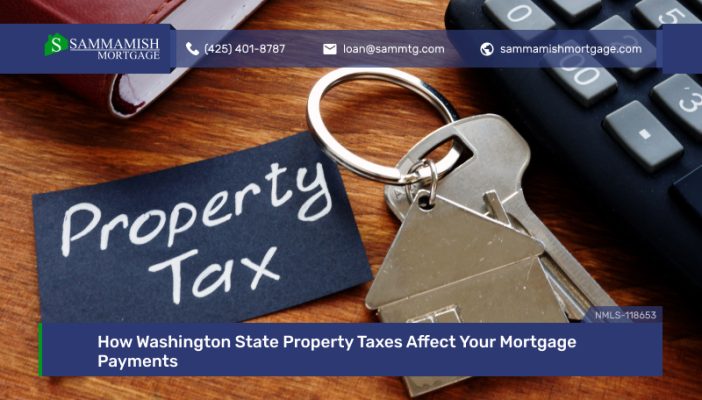No Obligation and transparency 24/7. Instantly compare live rates and costs from our network of lenders across the country. Real-time accurate rates and closing costs for a variety of loan programs custom to your specific situation.

You probably already know that a typical mortgage payment includes both the principal and interest. But did you know property taxes often get lumped in as well?
Property taxes are actually one of several components that can influence the size of your monthly payments. So it’s important to understand what they are and where they come from.
In this guide, we’ll look at how Washington State property taxes affect your mortgage payments, and how those taxes are determined.
In Washington state, all real estate property is subject to taxation unless it’s specifically exempted by law. This applies to detached homes, condos, townhomes, and other types of housing units.
According to the Washington State Department of Revenue, property taxes account for roughly 30% of the state and local taxes. The state uses these revenues for a wide range of purposes, but mainly for public schools, libraries, parks and recreation, and fire protection.
Washington property tax law requires county tax assessors to appraise homes at 100% of their fair market value. This is the amount that a buyer would be willing to pay for the property, based on current market conditions and the home’s unique features.
County tax assessors can use a variety of methods to determine the fair market value of a home. In the state of Washington, they typically use one of the following methods:
The Washington state constitution limits the annual property tax rate for individual properties to 1% of their fair value (or $10 per $1,000). This is often referred to as the “$10 limit.”
All counties in the state revalue properties annually. County officials must also conduct a physical inspection at once every six years, according to state law.
Your property taxes can affect the size of your monthly mortgage payments, though to a lesser degree when compared to the principal and interest.
In a typical mortgage scenario, the monthly payments consist of four individual components. The acronym PITI is often used to describe these four components.
Here’s what PITI stands for:
The principal and interest make up the bulk of the monthly mortgage payments, while the property taxes and insurance typically make up a smaller portion.
It’s important to understand how all of these things are connected. If the county reassesses your home and adjusts the value upward, it could result in higher property taxes and a bigger monthly mortgage payment.
If you believe that your home has been overvalued for tax purposes, you can dispute the Washington property tax assessment. Here’s a step-by-step guide based on the official guidelines from the state’s Department of Revenue:
This should always be the first step. Discuss your concerns with the assessor and try to reach an agreement. Often, disagreements can be resolved directly at this level. You can also request the comparable sales information that the assessor used to determine your property’s value.
If you can’t settle with the assessor, file an appeal with the BOE. Get the appeal form from the assessor’s office, BOE office, or download it here: https://dor.wa.gov/forms-publications/forms-subject/property-tax-forms
The completed petition must be filed with the BOE by July 1 of the assessment year you are appealing, or within 30 days of the date the change of value notice was mailed, whichever is later. Some counties offer extensions up to 60 days. Check with your BOE (where the property is located) for their specific deadline.
Don’t just say the valuation is too high. Provide concrete evidence to support your claim. This can include a recent property appraisal, examples of similar properties that sold for less, or proof of excessive deterioration that might lower your home’s value.
Submit the appeal form with all supporting evidence by the deadline. The BOE will review your case and issue a decision. If you or the assessor disagree with the BOE’s decision, you can appeal further to the State Board of Tax Appeals (BTA).
To successfully challenge your assessed value, you have to provide strong market evidence that contradicts it. Your goal is to provide evidence that clearly shows the assessed value does not align with the current market value of the home.
We’ve covered some important information here that all Washington home buyers and homeowners should know. So let’s summarize the key takeaways:
Real estate taxes in Washington are just part of the overall cost of homeownership. While having a home that’s valued at a high price is great for equity purposes, it also means that you’re paying more in property taxes. It’s important to know how your Washington State property taxes affect your mortgage payments so you can budget accordingly.
Are you thinking of buying a home some time soon? If so, we’re here to help. Sammamish Mortgage works with home buyers and homeowners all across the state of Washington. Please contact us if you have questions about mortgage financing, to get an instant rate quote, or would like to apply for a loan.


Whether you’re buying a home or ready to refinance, our professionals can help.
{hours_open} - {hours_closed} Pacific
No Obligation and transparency 24/7. Instantly compare live rates and costs from our network of lenders across the country. Real-time accurate rates and closing costs for a variety of loan programs custom to your specific situation.